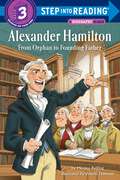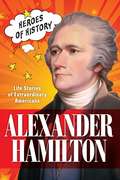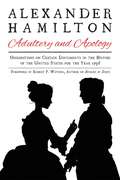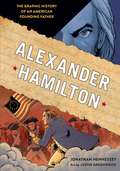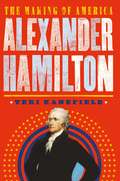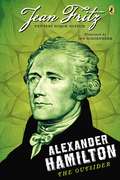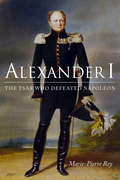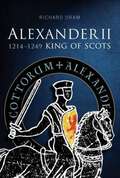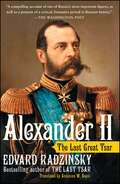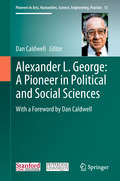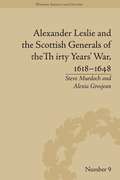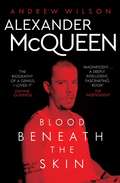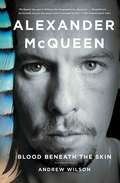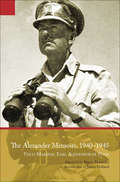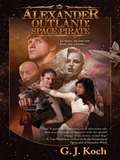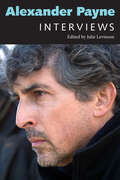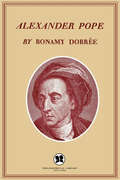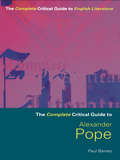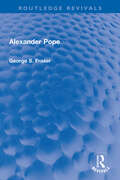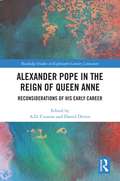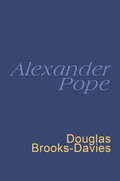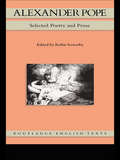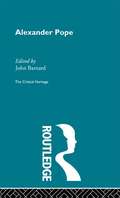- Table View
- List View
Alexander Hamilton: From Orphan to Founding Father (Step into Reading)
by Monica KullingFans of the Broadway musical Hamilton and American history lovers will want to share this illustrated biography of Alexander Hamilton with their young readers. Did you know that one of our Founding Fathers was not born in America? An orphan from the West Indies, Alexander Hamilton came to the colonies and played an important role in the Revolutionary War, rising to become General George Washington&’s right-hand man. But his accomplishments don&’t stop there! He helped obtain the ratification of the Constitution; he was America&’s first secretary of the treasury; and he established the first national bank and the U.S. Mint. A man of ambition, loyalty, and principle, he is now being celebrated as the prominent patriot he was. Step 3 Readers feature engaging characters in easy-to-follow plots about popular topics—for children who are ready to read on their own.
Alexander Hamilton: Life Stories of Extraordinary Americans (TIME Heroes of History #1)
by The Editors of TIMETIME introduces the Heroes of History series-life stories of extraordinary Americans, illustrated in full-color. <P><P>Think you know everything about Alexander Hamilton? Think again! <P>The original immigrant success story brought to life in the musical Hamilton is every bit as amazing and controversial now as it was in the 18th century. <P>TIME tells the whole story of the nation's first Secretary of the Treasury-a founding father with a complicated and ultimately tragic story that didn't end with the duel in Weehawken. <P><P>Young adult readers ready to look beyond the "Who Was" series deserve a collection of biographies all their own with the details, nuance, and depth they crave. <P>With dozens of reproductions of artworks, artifacts from the period, photographs, and illustrations created to bring the subject alive, this first book in the new series, Heroes of History, captures "the quintessential immigrant success story" and brings his life and chaotic, revolutionary times into fresh focus.
Alexander Hamilton: Observations on Certain Documents in the History of the United States for the Year 1796
by Alexander Hamilton Robert P. WatsonWritten by Hamilton himself to confess to the affair he conducted with Maria Reynolds, Alexander Hamilton: Adultery and Apology is Hamilton’s attempt to defend and rationalize his misdoings, and ultimately salvage what was left of his reputation.The pamphlet was originally published in 1796 after accusations of the adultery arose. This personal exposé reveals a man, whom the public initially revered as a politician and Founding Father, as a flawed human-being. Within these documents Hamilton describes his exploits in impeccable detail and languid prose, at the risk of tarnishing his public image, to prove to the public that he had nothing to hide.With a new foreword by Robert Watson, presidential scholar and author of Affairs of State, delve into this exquisite, essential account of history’s most scandalous love affairs.
Alexander Hamilton: The Graphic History of an American Founding Father
by Jonathan HennesseyA graphic novel biography of the American legend who inspired the hit Broadway musical Hamilton. Alexander Hamilton was one of the most influential figures in United States history—he fought in the Revolutionary War, helped develop the Constitution, and as the first Secretary of the Treasury established landmark economic policy that we still use today. Cut down by a bullet from political rival Aaron Burr, Hamilton has since been immortalized alongside other Founding Fathers such as George Washington and Thomas Jefferson—his likeness even appears on the ten-dollar bill. In this fully-illustrated and impeccably researched graphic novel-style history, author Jonathan Hennessey and comic book illustrator Justin Greenwood bring Alexander Hamilton&’s world to life, telling the story of this improbable hero who helped shape the United States of America.
Alexander Hamilton: The Making Of America
by Teri KanefieldThe America that Alexander Hamilton knew was largely agricultural and built on slave labor. He envisioned something else: a multi-racial, urbanized, capitalistic America with a strong central government. He believed that such an America would be a land of opportunity for the poor and the newcomers. But Hamilton's vision put him at odds with his archrivals who envisioned a pastoral America of small towns, where governments were local, states would control their own destiny, and the federal government would remain small and weak. The disputes that arose during America's first decades continued through American history to our present day. Over time, because of the systems Hamilton set up and the ideas he left, his vision won out. Here is the story that epitomizes the American dream--a poor immigrant who made good in America. In the end, Hamilton rose from poverty through his intelligence and ability, and did more to shape our country than any of his contemporaries.
Alexander Hamilton: The Outsider
by Jean FritzAward-winning biographer Jean Fritz brings one of America's favorite Founding Fathers to life! Most people know that Alexander Hamilton was killed in a duel with Aaron Burr, and that his face is on the ten-dollar bill. But he was much more than that, and here acclaimed biographer Jean Fritz explores all facets of his life. Born in the West Indies, Hamilton arrived in New York as an outsider. He fought in the Revolution and became Washington's most valuable aide-de-camp. He was there for the writing of the Constitution and became the first Secretary of the Treasury. Fritz's talent for bringing historical figures to life shines as she shares her fascination with this man of action who was honorable, ambitious, and fiercely loyal to his adopted country. .
Alexander I: The Tsar Who Defeated Napoleon (NIU Series in Slavic, East European, and Eurasian Studies)
by Marie-Pierre ReyAlexander I was a ruler with high aspirations for the people of Russia. Cosseted as a young grand duke by Catherine the Great, he ascended to the throne in 1801 after the brutal assassination of his father. In this magisterial biography, Marie-Pierre Rey illuminates the complex forces that shaped Alexander's tumultuous reign and sheds brilliant new light on the handsome ruler known to his people as "the Sphinx." Despite an early and ambitious commitment to sweeping political reforms, Alexander saw his liberal aspirations overwhelmed by civil unrest in his own country and by costly confrontations with Napoleon, which culminated in the French invasion of Russia and the burning of Moscow in 1812. Eventually, Alexander turned back Napoleon's forces and entered Paris a victor two years later, but by then he had already grown weary of military glory. As the years passed, the tsar who defeated Napoleon would become increasingly preoccupied with his own spiritual salvation, an obsession that led him to pursue a rapprochement between the Orthodox and Roman churches. When in exile, Napoleon once remarked of his Russian rival: He could go far. If I die here, he will be my true heir in Europe. It was not to be. Napoleon died on Saint Helena and Alexander succumbed to typhus four years later at the age of forty-eight. But in this richly nuanced portrait, Rey breathes new life into the tsar who stood at the center of the political chessboard of early nineteenth-century Europe, a key figure at the heart of diplomacy, war, and international intrigue during that region's most tumultuous years.
Alexander II: King of Scots, 1214–1249 (The\northern World Ser. #No. 16)
by Richard OramAn account of the triumphs and tragedies, personal and political, of the controversial thirteenth-century Scottish king from the medieval historian and author. In equal measure state-builder, political unifier, ruthless opportunist, and bloody-handed aggressor, Alexander II has been praised or vilified by past historians but has rarely been viewed in the round. This book explores the king&’s successes and failures, presenting a fresh assessment of his contribution to the making of Scotland as a nation. It lifts the focus from an introspective national history to look at the man and his kingdom in wider British and European history, examining his international relationships and offering the first detailed analysis of the efforts to work out a lasting diplomatic solution to Anglo-Scottish conflict over his inherited claims to the northern counties of England. More than just a political narrative, the book also seeks to illuminate aspects of the king&’s character and his relationships with those around him, especially his mother, his first wife, Joan Plantagenet, and the great magnates, clerics, and officials who served in his household and administration. The book illustrates the processes by which the mosaic of petty principalities and rival power bases that covered the map of late twelfth-century Scotland had become by the mid-thirteenth century a unified state, hybrid in culture(s) and multilingual but acknowledging a common identity as Scots.
Alexander II: The Last Great Tsar
by Edvard RadzinskyAlexander II was Russia's Lincoln, and the greatest reformer tsar since Peter the Great. He was also one of the most contradictory, and fascinating, of history's supreme leaders. He freed the serfs, yet launched vicious wars. He engaged in the sexual exploits of a royal Don Juan, yet fell profoundly in love. He ruled during the "Russian Renaissance" of Dostoevsky, Tolstoy, and Turgenev -- yet his Russia became the birthplace of modern terrorism. His story could be that of one of Russia's greatest novels, yet it is true. It is also crucially important today. It is a tale that runs on parallel tracks. Alexander freed 23 million Russian slaves, reformed the justice system and the army, and very nearly became the father of Russia's first constitution and the man who led that nation into a new era of western-style liberalism. Yet it was during this feverish time that modern nihilism first arose. On the sidelines of Alexander's state dramas, a group of radical, disaffected young people first experimented with dynamite, and first began to use terrorism. Fueled by the writings of a few intellectuals and zealots, they built bombs, dug tunnels, and planned ambushes. They made no less than six unsuccessful attempts on Alexander's life. Finally, the parallel tracks joined, when a small cell of terrorists, living next door to Dostoevsky, built the fatal bomb that ended the life of the last great Tsar. It stopped Russian reform in its tracks. Edvard Radzinsky is justly famous as both a biographer and a dramatist, and he brings both skills to bear in this vivid, page-turning, rich portrait of one of the greatest of all Romanovs. Delving deep into the archives, he raises intriguing questions about the connections between Dostoevsky and the young terrorists, about the hidden romances of the Romanovs, and about the palace conspiracies that may have linked hard-line aristocrats with their nemesis, the young nihilists. Alexander's life proves the timeless lesson that in Russia, it is dangerous to start reforms, but even more dangerous to stop them. It also shows that the traps and dangers encountered in today's war on terrorists were there from the start.
Alexander L. George: With a Foreword by Dan Caldwell (Pioneers in Arts, Humanities, Science, Engineering, Practice #15)
by Dan CaldwellAlexander L. George was one of the most productive and respected political scientistsof the late twentieth century. He and his wife, Juliette George, wrote one of the firstpsychobiographies, and Professor George went on to write seminal articles and booksfocusing on political psychology, the operational code, foreign policy decisionmaking,case study methodology, deterrence, coercive diplomacy, policy legitimacy, and bridgingthe gap between the academic and policymaking communities. This book is the firstand only one to contain examples of the works across these fields written by AlexanderGeorge and several of his collaborators.• This is a collection of Alexander L. George's works from the major fields to whichhe contributed.• There are biographical essays by his wife and co-author (Juliette L. George), daughter(Mary George Douglass), former student (Dan Caldwell), and professional colleague(Janice Gross Stein).• There are 25 photographs of Alexander L. George and his family which have notpreviously been published.
Alexander Leslie and the Scottish Generals of the Thirty Years' War, 1618–1648 (Warfare, Society and Culture #9)
by Alexia Grosjean Steve MurdochField Marshal Alexander Leslie was the highest ranking commander from the British Isles to serve in the Thirty Years’ War. Though Leslie’s life provides the thread that runs through this work, the authors use his story to explore the impacts of the Thirty Years’ War, the British Civil Wars and the age of Military Revolution.
Alexander McQueen
by Andrew WilsonWhen Alexander McQueen committed suicide in February 2010, aged just 40, a shocked world mourned the loss of its most visionary fashion designer. McQueen had risen from humble beginnings as the youngest child of an East London taxi driver to scale the heights of fame, fortune and glamour. He designed clothes for the world's most beautiful women including Kate Moss and Naomi Campbell. In business he created a multi-million pound luxury brand that became a favourite with both celebrities and royalty, most famously the Duchess of Cambridge who wore a McQueen dress on her wedding day. But behind the confident facade and bad-boy image, lay a sensitive soul who struggled to survive in the ruthless world of fashion. As the pressures of work intensified, so McQueen became increasingly dependent on the drugs that contributed to his tragic end. Meanwhile, in his private life, his failure to find lasting love with a string of boyfriends only added to his despair. And then there were the dark secrets that haunted his sleep... A modern-day fairy tale infused with the darkness of a Greek tragedy, this book will tell the sensational story of McQueen's rise from his hard East London upbringing to the hedonistic world of fashion. Those closest to the designer - his family, friends and lovers - have spoken for the first time about the man they knew, a fragmented and insecure individual, a lost boy who battled to gain entry into a world that ultimately destroyed him.
Alexander McQueen: Blood Beneath the Skin
by Andrew WilsonThe first, definitive biography of the iconic, notoriously private British fashion designer Alexander McQueen “offers new insights...and provides unprecedented access to a misunderstood soul” (The Boston Globe).When forty-year-old Alexander McQueen committed suicide in February 2010, a shocked world mourned the loss. McQueen had risen from humble beginnings as the son of an East London taxi driver to scale the heights of fame, fortune, and glamour. He created a multimillion-dollar luxury brand that became a favorite with celebrities, including Kate Moss and Naomi Campbell. He designed clothes for the world’s most beautiful women and royalty, most famously the Duchess of Cambridge, who wore a McQueen dress on her wedding day. But behind the confident facade and bad-boy image, lay a sensitive soul who struggled to survive in the ruthless world of fashion. As the pressures of work intensified, McQueen became increasingly dependent on the drugs that contributed to his tragic end. Meanwhile, his failure to find lasting love in a string of boyfriends only added to his despair. And then there were the secrets that haunted his sleep… A modern-day fairy tale infused with the darkness of a Greek tragedy, Alexander McQueen provides “a thorough and emotionally compelling exploration…of a complex and enigmatic artist” (Publishers Weekly). Andrew Wilson’s “magnificent” (The Independent, UK) and “compelling and heavily researched bio” (Entertainment Weekly), featuring never-before-seen photographs and rare interviews, dispels myths, corrects inaccuracies, and shares new insights into McQueen’s private life and the source of his creative genius.
Alexander Memoirs, 1940–1945
by Alexander of TunisAfter his first meeting with General Alexander in August 1942, Lieutenant-General Sir Brian Horrocks wrote that: By repute he was Winston Churchills fire brigade chief par excellence: the man who was always dispatched to retrieve the most desperate situations.Churchill was indeed in need of a fire brigade chief. Allied forces had been chased back across the desert by Rommel. Alexander bought a new hope to the Desert Rats: he instilled them with his own confidence and thought of victory. Under his command, Montgomery was ready to fight and win the battle of El Alamein. Even as his generals drove the enemy from North Africa, Alexander was planning far ahead for Sicily and Operation Husky: the first major seaborne invasion by either side during the war.It was said that before El Alamein the Allies never knew victory, and after El Alamein never knew defeat: much of the credit belongs to Alexander. For decades his contribution to the British efforts in both wars has been overlooked. Here, however, is a comprehensive edition of his personal and candid memoirs, which includes judgments on such men as Montgomery, Patton and Churchill. He also details his role in leading the withdrawal of the 1st Infantry Division at Dunkirk, his dealings with Stilwell in Burma and the bombing of the Monte Cassino abbey.
Alexander Outland
by G. J. KochCaptain Alexander Outland of the Sixty-Nine (short for Space Vessel 369, of course) is the best pilot in the galaxy. He's also a pirate, a smuggler, and loved and loathed by women in umpteen solar systems. His crew of strays and misfits includes an engineer of dubious sanity, a deposed planetary governor, an annoyingly unflappable Sexbot copilot, and a slinky weapons chief who stubbornly refuses to give the captain a tumble.Outland just wants to make a decent living skirting the law, but when an invisible space armada starts cutting into his business, he soon finds himself in hot water with the military, the mob, mad bombers, and an extended family of would-be conquerors. And that's not counting an occasionally telepathic spy . . . .Like any sensible scoundrel, he hates heroics. They're risky and they don't pay well. But to keep his ship and crew in one piece, and make time with a certain hard-to-get weapons chief, he might just have to make an exception-and save the galaxy in spite of himself!
Alexander Outland
by Gj KochCaptain Alexander Outland of the Sixty-Nine (short for Space Vessel 369, of course) is the best pilot in the galaxy. He's also a pirate, a smuggler, and loved and loathed by women in umpteen solar systems. His crew of strays and misfits includes an engineer of dubious sanity, a deposed planetary governor, an annoyingly unflappable Sexbot copilot, and a slinky weapons chief who stubbornly refuses to give the captain a tumble. Outland just wants to make a decent living skirting the law, but when an invisible space armada starts cutting into his business, he soon finds himself in hot water with the military, the mob, mad bombers, and an extended family of would-be conquerors. And that's not counting an occasionally telepathic spy . . . . Like any sensible scoundrel, he hates heroics. They're risky and they don't pay well. But to keep his ship and crew in one piece, and make time with a certain hard-to-get weapons chief, he might just have to make an exception-and save the galaxy in spite of himself!
Alexander Payne: Interviews (Conversations with Filmmakers Series)
by Julie LevinsonSince 1996, Alexander Payne (b. 1961) has made seven feature films and a short segment of an omnibus movie. Although his body of work is quantitatively small, it is qualitatively impressive. His movies have garnered numerous accolades and awards, including two Academy Awards for Best Adapted Screenplay. As more than one interviewer in this volume points out, he maintains an impressive and unbroken winning streak. Payne's stories of human strivings and follies, alongside his mastery of the craft of filmmaking, mark him as a contemporary auteur of uncommon accomplishment. In this first compilation of his interviews, Payne reveals himself as a captivating conversationalist as well. The discussions collected here range from 1996, shortly after the release of his first film, Citizen Ruth, to the 2013 debut of his film, Nebraska. He also mentions the long process of bringing to fruition his most recent film, Downsizing. Over his career, he muses on many subjects including his own creative processes, his commitment to telling character-centered stories, and his abiding admiration for movies and directors from across decades of film history. Critics describe Payne as one of the few contemporary filmmakers who consistently manages to buck the current trend toward bombastic blockbusters. Like the 1970s director-driven cinema that he cherishes, his films are small-scale character studies that manage to maintain a delicate balance between sharp satire and genuine poignancy.
Alexander Pope
by Bonamy DobreeA biographical and critical study. From a life so crammed with incident, Mr. Dobre has chosen those facts which seem most to bear on the poet's development in life through art.
Alexander Pope (Routledge Guides to Literature)
by Paul BainesSo many questions surround the key figures in the English literary canon, but most books focus on one aspect of an author's life or work, or limit themselves to a single critical approach. Alexander Pope is a comprehensive, user-friendly guide which: * offers information on Pope's life, contexts and works * outline the major critical issues surrounding his works, from the time they were written to the present *explains the full range of different critical views and interpretations * offers guides to further reading in each area discussed.
Alexander Pope (Routledge Revivals)
by G.S. FraserFirst published in 1978, Alexander Pope is an introduction to Pope’s life and work, which sets the poet solidly in his age and relates the liveliness and variety of his poetry to the strange combination of chronic invalidism and a sociable disposition which marked his life. G. S. Fraser argues that Pope is a more varied figure than his reputation as a great satirist indicates and that he is in some ways more a survivor from the Restoration than a precursor of middle-class morality. Special attention is paid to the poems in the first Collected Works of 1717, which displays both Pope’s gaiety and his sense of colour and beauty. The dignity of his translation of Homer and the thoughtfulness and piety of An Essay on Man are also emphasised. His satirical genius, which found its greatest expression during the later years of declining health, is not ignored but set in perspective. Many readers of this persuasively argued study will be surprised to discover in it a gayer, more warm-hearted and more likeable Pope than they had, perhaps, imagined. Students of English literature will find this book immensely refreshing.
Alexander Pope in The Reign of Queen Anne: Reconsiderations of His Early Career (Routledge Studies in Eighteenth-Century Literature)
by Daniel Derrin A. D. CousinsThis is the first collection of essays since George Sherburn’s landmark monograph The Early Career of Alexander Pope (1934) to reconsider how the most important and influential poet of eighteenth-century Britain fashioned his early career. The volume covers Pope’s writings from across the reign of Queen Anne and just beyond. It focuses, in particular, on his interaction with the courtly culture constellated round the Queen. It examines, for instance, his representations of Queen Anne herself, his portrayals of politics and patronage under her reign, his negotiations with current literary theory, with the classical tradition, with chronologically distant yet also contemporaneous English poets, with current thought on the passions, and with membership of a religious minority. In doing so, it comprehensively reconsiders anew the ways in which Pope, increasingly supportive of Anne’s rule and mindful of the Virgilian rota, sought at first to realise his authorial aspirations.
Alexander Pope: Everyman's Poetry
by Alexander Pope Douglas Brooks-DaviesChief satirist of the Augustan age, as seen in The rape of the Lock, Pope spoke out against society and his profession, in poetry of bitter invective and biting humour.
Alexander Pope: Selected Poetry and Prose (Routledge English Texts #Vol. Xi)
by Alexander PopeAlexander Pope's technical polish and intellectual poise appeal to the subtlest audience. This selection includes The Rape of the Lock, Eloisa to Abelard, and extracts from The Dunciad and the translation of Homer.
Alexander Pope: The Critical Heritage (Critical Heritage Ser.)
by John BarnardThe Critical Heritage gathers together a large body of critical sources on major figures in literature. Each volume presents contemporary responses to a writer's work, enabling students and researchers to read for themselves, for example, comments on early performances of Shakespeare's plays, or reactions to the first publication of Jane Austen's novels.The carefully selected sources range from landmark essays in the history of criticism to journalism and contemporary opinion, and little published documentary material such as letters and diaries. Significant pieces of criticism from later periods are also included, in order to demonstrate the fluctuations in an author's reputation.Each volume contains an introduction to the writer's published works, a selected bibliography, and an index of works,authors and subjects.The Collected Critical Heritage set will be available as a set of 68 volumes and the series will also be available in mini sets selected by period (in slipcase boxes) and as individual volumes.
